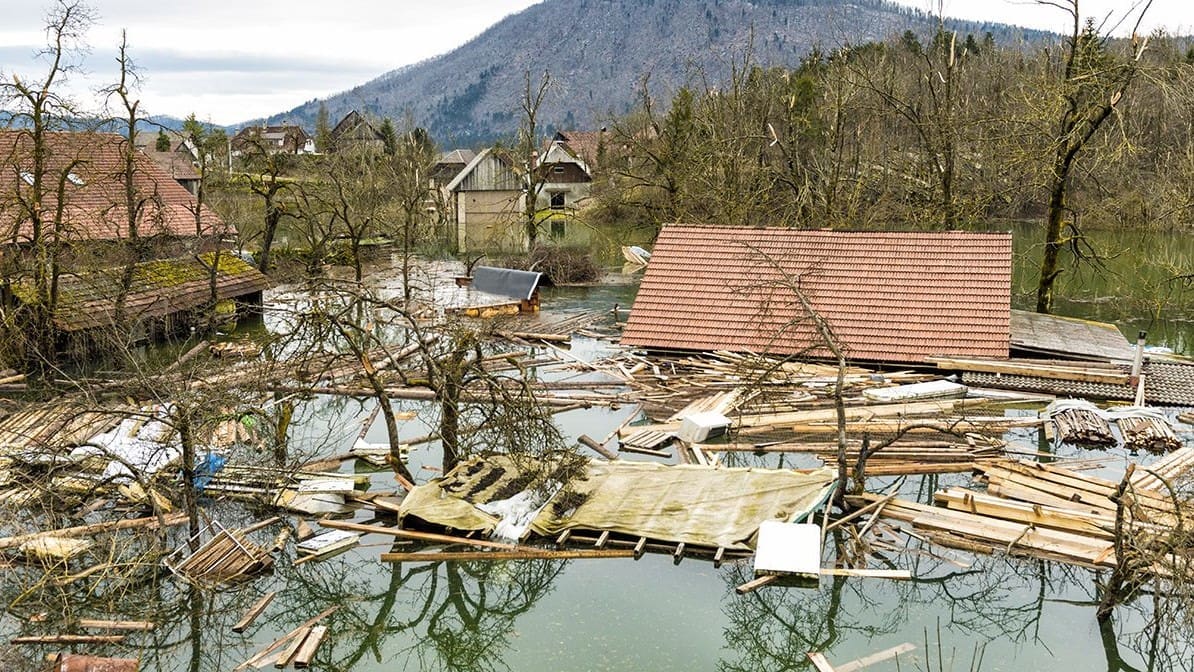- Home
- Relationships
- Love Is Not Proud

Love Is Not Proud
 Excerpt taken from Love Is: A Yearlong Experiment of Living Out 1 Corinthians 13 Love by Kim Sorrelle
Excerpt taken from Love Is: A Yearlong Experiment of Living Out 1 Corinthians 13 Love by Kim Sorrelle
Chapter 5
Love Is Not Proud
LOVE IS NOT PROUD. REALLY? Maybe Paul got this one wrong.
Love is proud. I love and I am proud. I am proud of my kids, grandkids, and euchre-playing abilities. I am proud of my friends’ accomplishments, my coworkers’ successes, and my taste in clothes. I am proud of my coaching record, my players, and my driving skills. Lee Greenwood is proud to be an American. Merle Haggard is proud to be an Okie from Muskogee. James Brown is just loud and proud. Punch, peacocks, and Marines are proud. Everyone wants to make their momma proud. Proud Mary just keeps on burning.
Yet pride wins the first spot of the sinful seven. Pride is the death of some and swallowed by others. Pride keeps you from apologizing or asking for help. Pride got some angels evicted, is an abomination, and leads to destruction. It is the fuel that ignites a feud, ends marriages, divides families, and starts wars.
Arrogance and pride are fraternal twins; they stay pretty close together, often in the same verse, often one mistaken for the other.
Pride instigates all other sins, like boasting. Without boasting, pride would have no voice. Pride entangles and captivates hearts. All opposing ideas, perspectives, and beliefs are flagged by pride. Then boasting takes over with “I am smarter, more informed, and more enlightened than you.” Arguments ensue, ears close as voices get louder.
Humility is the opposite of pride. It opens ears well before mouths. People listen to a humble heart, a humble delivery. Humble isn’t loud or accusatory. Humble is gentle and humble listens.
My dear friend Jim Wilson exuded humility and was the unwitting poster boy for patient love. In my smarter, more informed, and more enlightened family, the longer you live the less you listen. By Jim’s age, you know everything. Conversations included only the like-minded, reserving arguments for others. Jim was open-minded, always. He had beliefs, strong beliefs, opinions, and experience. Yet not a hint of pride impeded his heart, mind, or ears, as he thoughtfully listened and then spoke.
After years of working around the world with Youth for Christ, Jim started Careforce International, a Christian humanitarian, partnering organization working with people who had a passion, a mission, a vision to help people in need in their own country. Knowing the local people understood the language, culture, and real needs, Careforce would walk alongside helping with funding, supplies, a plan, whatever was needed, always working toward self-sustainability.
I came in contact with Careforce on my first trip to the Dominican Republic. Impressed by the unique approach, I called them the minute my feet hit US soil. Within a week, Jim and I were meeting face-to-face in his office in Burlington, Ontario. That day I joined the board, then had a chance to do some disaster relief work in a few countries and travel with Jim and Flo, his sweet, sweet wife. Traveling with Jim, I witnessed respect, kindness, and love for partners around the world. Never “Well, in Canada we …” but just sincere admiration and fascination, always learning, always growing. With scads of experience and truckloads of wisdom, Jim had plenty to share and freely gave it away, but only when asked and always gently. Never forcing an agenda or pushing his systems, Jim made you feel like his idea wasn’t better, just another way of reaching the same goal. In reality, most of the time, Jim’s ways were better. But you sure never knew that he knew that.
On December 16, 1999, torrential rains induced flash floods, destroying thousands of houses, leaving tens of thousands stranded in Vargas, Venezuela. Starting well after sunset in areas with sketchy electricity, no view of the storm gave warning. Young children were swept out of their beds. The relentless force snatched babies from their mothers’ arms only to reach back and snatch the mothers too. Fathers clung to walls and families, not understanding the monster bent on dragging them out to a watery grave. Millions of gallons of water moved so much earth and debris, some areas were buried under ten feet of mud. Bridges collapsed, buildings crumbled, while cars and bodies were washed out to sea.
Tens of thousands were left homeless, and as many as thirty thousand people died. The waters separated families, with many hoping to find each other and terrified they wouldn’t.
I flew into Caracas with my youngest son and a mission. My job was to see what was needed, figure out how to safely get it to where it was needed, and then make it happen.
Caracas is a bustling town with five-star hotels and one-star barrios. With a clear division between the haves and the have-nots, Noah and I were warned to stay far away from the have-nots and just hang where the haves do.
Our hotel opened its arms and our room invited us in. Marriott seldom disappoints.
After depositing our suitcases, we headed out into the capital to search for wherever we were supposed to go. God always seems to know the way. Luckily so did our cab driver. Through his little English and my bit of Spanish, we communicated pretty well. Andres agreed to be our driver for the next few days as we navigated our way through the congested city. First stop, a refugee center.
Loves Does Not Compete
The Poliedro de Caracas seats twenty thousand people. The huge complex for concerts, shows, and sporting events was inaugurated in 1974 with George Foreman kicking some Ken Norton booty in just two rounds. It was too brief for fans, but George and his sons George, George, George, George, and George were still thrilled for the victory (or would’ve been, if they had all been alive at the time).
Just outside the arena’s main entry were lists taped to windows and nailed to telephone poles. List after list, name after name; names of the missing, and names of the found. Each day new lists arrived from around the city. Mobs of children hoping to find a parent surrounded the rolls until huddles of anxious mommas pushed through, praying they’d spot their child’s name. My chest tightens at the thought of that sight. How awful to be a child in a strange place, surrounded by strangers, scanning thousands of lines of ten-point type. How painful to be a mom, helplessly waiting for the next list to arrive. The lists were separated into the living and the dead. Lists from other refugee camps and lists from the morgue as bodies were unburied and identified. Weeping, wailing, laughter, explosions of joy, all melded into one somber song.
Working our way through the crowd, Noah and I no sooner stepped through the door when a yank on my arm nearly sent me to the ground. Attached to the yanking hand, a lovely woman with cheerless deep brown eyes.
“Americano?”
“Yes.”
“Come.”
Mary toured us all around, starting on the first floor and then headed up to more of the same. Mattresses carpeted every square inch of the cement floors, every closet, locker room, hallway, and even between rows of seating. Some mattresses were temporarily empty while others served a multitude of purposes: chairs, sofas, play areas, cribs, dining tables. Each held the belongings of the transitory user. Wall-to-wall mattresses with wall-to-wall people, some coughing, some sleeping, all living in shock.
Noah pulled out his digital camera and snapped a picture. The second he flipped the camera around to show a shot of three young boys sitting on a cot, the weighty fog muddling everyone’s mood started dissipating, lifting the burdensome load. Like tween girls to a boy band, young children swarmed around him while he continued to click and show the marvels of modern picture taking. Before long, the hive began to shake with giggles. Contagious as measles, all around me smiles turned into belly laughs. The adults were enjoying the moment at least as much as the kids. Laughter really is good for the soul.
Overwhelmed and overworked, one lone man doctored the thousands. With people on top of people, sharing air, glasses, and toilets, viruses scattered like water from a sprinkler.
An extraordinary man. Dr. Gonzalez and his immediate family survived the storms, but a couple of relatives were among the missing. Severely understaffed with just two nurses rounding out the crew, the doctor did not have time to find anyone. I was honored that he found time for me.
“What do you need?”
“We have nothing but sickness. No antibiotics. No aspirin. No cough medicine. Not even a bandage.”
“I will try.” I have a Herculean aversion to making promises. Until I know that I know that I know, I really don’t know and am the first to admit it.
Having learned the hard way that there is no use in sending anything if it is destined to be pillaged at the docks, I headed for the water. Mary came along for the ride. She spoke more English than the cab driver, and between the two, they were nearly fluent.
Men in fatigues were standing around a lot of buildings, same drill, different port.
“Who is in charge?” I asked through a rolled-down window.
“Ve allí.”
Not understanding the words, I did understand the pointing finger. So ve allí we went.
Again through the window, “Who is in charge?”
Again some words and a finger.
Mary, Noah, and I ventured into an important-looking building at the end of a finger. There a man in a more impressive uniform sat behind a desk.
“I would like to see your boss.”
A shrug and phone call later, the jefe of jefes welcomed us into his impressive office.
Explaining the needs of the refugee center, I then explained what I could do.
“I can get it here, but I need to know what it will all get to Peligro.”
“Of course, of course.”
He wasn’t really convincing. “I can only get the doctor what he needs if I have a promise that the medicines will get to him.”
“Of course, of course.”
“How are your wife and children?” I said, testing the waters.
“Of course, of course.”
Gracias and adios. I had to find a different way.
Back at the hotel, we bumped into a couple of men with a much larger nonprofit organization not far from mine. After hellos, I suggested that we work together to figure out the best way to help. While we were telling them where we had been and what we had learned, their eyes glazed over. Either I am a horrible storyteller or they were really tired. I know the context wasn’t princess-and-dragon captivating, but I would have loved to have received the information I was giving them at the start of my trip. Skipping steps one and two, heading into step three, I would be a whole day ahead. They just shrugged me off. Hmm, pride? Love is not proud. I was not feeling the love.
Because God is so cool, there just happened to be a guy within earshot of the fruitless conversation.
“Are you here to help?”
“Yep.”
“You have to meet my friend.”
Sounded good to me. I never met this guy before and I was already feeling the love.
Walking out to the parking lot, I decided that if he drove an unmarked cargo van and offered me candy before getting in, it might be good to forgo the trip. Since we walked up to a beautiful BMW and there wasn’t a sweet in sight, I felt perfectly comfortable getting into a stranger’s car in a strange country with Noah in tow. Of course, of course.
Pulling up to what had to be the most luxurious hotel in South America, I decided if he offered me candy on the way home, I would still take the ride.
Waiting for us in the opulent lobby, Omar Vizquel was all smiles and happiness. We sat down on furniture that nearly swallowed me like an oyster. Rearranging a bit, I started to feel more like an adult and less like Edith Ann.
Omar, it turns out, is a professional baseball player, a shortstop from Venezuela playing in the major leagues in the United States. Omar contacted every Latin American Major League player, requesting their presence in Caracas for a softball game to raise money for flood victims. Everyone said yes, except one, who thought he was a little too big for this game. Pride. Later it was discovered that he had been dropping some pills, giving him power over the baseball, hitting it like no other, resulting in a fall off the pride pedestal.
We talked for a long time. Omar gave me his number so we could stay in touch.
No candy was offered on the way back. I would have taken it. I was really hungry.
The next day was more of the same. With Marty and Andres leading the way, the hours were filled with more refugee camps, more government offices, and more “of course” answers. Throughout the day, Andres and Mary told their stories as we searched for the right doors leading to the right person.
Andres beamed, talking about his wife and four children, all under the age of six, a man in love. High school sweethearts, at eighteen they wed with babies coming not long after. Driving a taxi gave Andres a decent income to support his crew.
Mary had not been able to locate her family in the month since the floods. Each day she scoured the new lists, holding her breath while reading the names of the deceased, audibly praying as she read the names of those found alive in other camps. Until the floods, Mary worked as a travel agent, a good job in a nice office with her own desk, phone, and stapler. When her building slid into the ocean, so did her job. She lost her family, home, income, and clothes, everything in one night, one long tragic night.
More doors, more dead ends, but Noah and I gained new friends who will stay in our hearts forever.
With the next morning not showing any more promise, my patience waned. We were far from home, all we wanted to do was help, and we ran into multiple roadblocks. By noon, I was vexed and hungry, genuinely hangry, which added to my resolve. Lord Jesus, something has got to give.
“That’s it. Let’s go to the palace.”
“The palace?” Mary was confused. “For what?”
“We are going to see the president.”
Giving a look that said, “This lady be crazy,” Andres turned the car around and steered us in the right direction.
A sizable guy in uniform with a great big gun stopped us at the entry. His stern look wasn’t overly inviting.
“Just tell him I am Kim Sorrelle, and I am here to see the president.”
Words were exchanged. The military man stepped into the guard shack, made a phone call, then opened the gate.
…
Order your copy of Love Is: A Yearlong Experiment of Living Out 1 Corinthians 13 Love by Kim Sorrelle
Trending Now
Sign up today for your Inspiration Today Daily Newsletter
Supercharge your faith and ignite your spirit. Find hope in God’s word. Receive your Inspiration Today newsletter now!
Kim Sorrelle
Kim Sorrelle is the executive director of Rays of Hope International. Her work takes her from her home in Grand Rapids, Michigan, to isolated villages in Africa, small mountain communities in Haiti, and squatter neighborhoods in the Dominican Republic. A regular blogger, Kim is all the author of Cry Until You Laugh. Learn more at kimsorrelle.com.
Related Articles
June 27, 2025
Who Is My Neighbor: Bridging the Gap Between Emancipation and Equality (Part 2)
In “Who Is My Neighbor: Bridging the Gap,” we ask what it means to truly see, hear, and love our…
June 24, 2025
It’s All About Love
This excerpt explores the beauty of God’s design for marriage, showing how Scripture reflects His…
June 10, 2025
Freedom in Forgiveness
This excerpt explores the healing process and power of forgiveness in marriage, emphasizing how it…
June 2, 2025
The Mystery of Marriage
This excerpt explores the mystery of marriage as a divine reflection of Christ’s love for the…
Next Steps To Strengthen Your Walk
Inspiration Today Newsletter
Supercharge your faith and ignite your spirit. Find hope in God’s word. Receive your Inspiration Today newsletter now!
Christian Articles
Find articles to strengthen your walk and grow your faith. We have a wide range of topics and authors for you.
Submit A Prayer Request
We are here for you. Simply click on the button below to reach us by form, email or phone. Together we will lift our hearts and voices with you in prayer.





